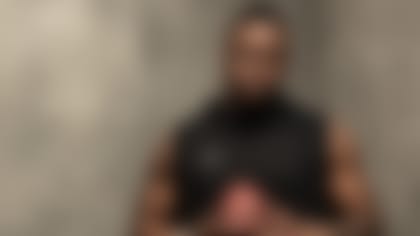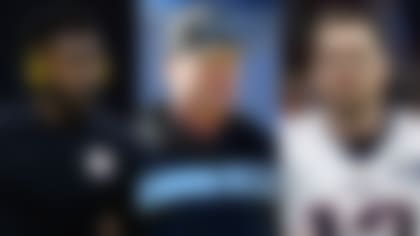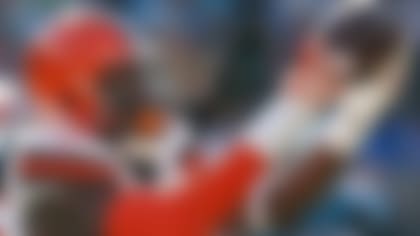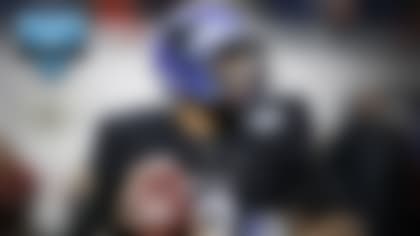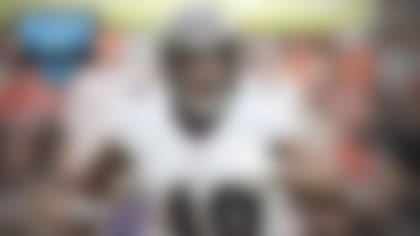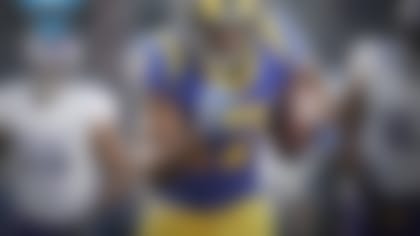NFL Media's Oklahoma Drill series presents exclusive, quick-hitting one-on-one interviews with players and coaches from around the league. No nonsense -- just football experiences directly from the source.
Jeremiah Allison
Linebacker, Undrafted
Interview by Nick Shook | Sept. 27, 2016
I've been playing chess since I was 3. My goal is always to be three moves ahead, and I have to know when I move this pawn or I move this knight. What are the consequences that can happen when I move this piece? Because my whole thing is, you can apply the game of chess to life. You have to be very strategic in what you do because that can determine the entire fate of the game.
My first offer came from UCLA. It felt really good when I knew that my mom wouldn't have to pay for me to go to college. And that I knew I was going to college and [scholarship offers] just start coming in. It feels good, but you're put in another category, because you can't do certain things that your friends can do [because of NCAA rules] who aren't getting recruited because you have a lot riding on what you're doing.
My biggest fear already happened to me, and that was losing my mom. I was scared to death. But when that happened, it kind of opened things up for me a bit. It relaxed me a little bit.
My next biggest fear is failure. I hate to let people down. I set too many high expectations for myself, and a lot of people have high expectations for me. So my goal is to, of course, appease myself, because it's the satisfaction of looking back on your goal list and see all the things you've checked off.
After I got the call, I got back to my house and the ambulance had already taken [my mom]. They gave me the story and said she'd had a heart attack. She was resuscitated three times and I was like, "OK, I know my mom is a fighter." So I went up to the hospital and she kept shaking, she wasn't conscious but she kept shaking because they'd shocked her a lot. I remember I stayed with her for two nights straight.
Time went on and I started noticing changes in my life and with her, but in my opinion, it was her preparing me for life without her, opposed to how if it would have just happened like that, I would have been lost. But because I got a chance to think about life without her, my transition to college was easy, because I was living on my own for seven months.
I haven't really had a time to mourn yet -- so my friend says. She said you graduated high school, you went straight to college. I literally left the next day and went up to Washington State, so I've always been doing something. I think I need to keep my mind active, because if I don't, it wanders in a place I don't want it to wander. The mind is a powerful thing.
The last place I want to be is left alone in my thoughts. I've got to be thinking of something, doing something, moving in a positive direction. I've got to keep it busy.
She always had this saying: "Show me what you working with." A lot of the times my sister will say it, or people online, people on my Twitter. They knew what type of person my mom was, and if they don't, I make sure I keep having my mom's legacy live on. ... Even though she's not here physically, it's bigger for me because they can just imagine what type of woman she was, being that she raised the man you see now.
She didn't like tattoos, so I got a pendant of her, a plate that says "RIP heart mom." At first, I was going to be real bold and get a tattoo of her, then I was like, Nah, because she'll probably haunt me in my dreams.
I went on my visit January 12 [to Washington State]. There were nine of us that went and we all committed. I was the last one to commit and I was like, Man, I love it here.
There's Cougs everywhere. The connections, you can't really put them into words. They are amazing. I got a chance to meet a lot of good people at Washington State. Good coaching, good friendships, just a lot of positive things. It's a college town run by students. It's a place where you go to find yourself.
You don't really ever stop playing football because you apply football to everything you do in life. Being that I may no longer be playing football physically, Coach [Dennis] Simmons broke it down to me. He said, " ... What you're going to miss is calling yourself a football player and you're going to miss the locker room."
When I put all of that in perspective, [he's right]. Don't get me wrong, I love it, it's a stress reliever. But I'm still able to be around the game. At the end of the day, if this means it's the end, I had a good run at it.
You've got a camera following you around [for NFL Network's "Undrafted"], but then I got used to it. You get a lot of neck turns and stuff like that. I remember my dad, he's a horrible actor. Like that first episode, I wasn't supposed to see him until the next day so it could look authentic, but how do you tell your dad, "No, don't pick me up from the airport?" I saw him the night before, and we had to reenact him seeing me for the first time, so we had to cut so many times. I was like, "Dad, that's not you."
I became so comfortable with the camera. ... It was a fun environment, I like to be an easy person to work with, because I don't want people dreading their job.
With the show, it's a documentation of my life. My whole thing was I want to inspire people, inspire the youth. But if I just so happen to inspire people older than me, it's just an extra notch on my belt.
The goal is to be that example to persevere. I think that's the biggest thing. My goal is to inspire, and my goal is to add that extra push to people who feel that life is too tough.
The only thing I think I would have done differently is my mindset going in was, "I have to be a big linebacker." No one wants a small linebacker. I'm looking at Luke Kuechly and all of them. ... But at Washington State, we played at 225 [pounds] or 222, because [Coach] wanted fast linebackers.
I passed the eyeball test. The scout came in and he's grabbing me and is like, "Yeah, yeah, yeah." But I felt like I sacrificed my 40 time, which was my only knock on me in the [Minneapolis regional] combine. I ran a 4.81. I felt [the weight gain]. Everything else, bench was good, my vertical jump was good.
I would have passed the eyeball test without getting up to 235, but I wanted the scouts to know that those hits you see on the film, they come harder now that I'm at 235.
I like to view myself as being well-balanced. I like to educate myself with the mental tools to where you're not gonna out-think me in the classroom, nor are you going to out-think me in the streets, either. I just want to be well-balanced, because I feel that's a powerful combination.
We came out here on a train. We arrived on July 4 in L.A. I remember there were all my cousins I'd never seen before. Coming from Minnesota, my mom was telling me, "That's your cousin, that's your cousin, that's your cousin," and to me, they were just kids that I'm about to play with. But they got me ready for the streets of L.A.
You can tell a person is from L.A. just by their swagger. My thing is, I didn't want to be the outcast. Don't get me wrong, I like being unique, but I want to fit in, as well. I had to adapt the swagger a little bit.
Although I lived in [rough] neighborhoods, they knew me as the football player who got good grades. They pretty much made sure I didn't go down that path. They said, "You have something bigger than this," so they looked out for me.
[Getting a degree] felt good. I got two majors out of the deal. It's something that me and my mom worked toward since I was a kid. That's something that people can't take away from you. Now that I'm headed toward getting more letters behind my name and potentially my master's, I still have more education to get and more graduations, but I got the basic one out of the way.
My whole philosophy is, when adversity hits, there's two types of people. You have those who use adversity as a crutch and why they can't do something, and you have people who put their head down and use it as fuel to propel them to the next level in what they want to do.
